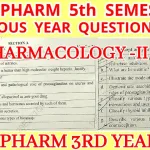These example questions and answers cover various essential topics in Pharm D 5th year. For a complete set of question papers and answers, accessing university archives, educational forums, or specialized study materials might be necessary.
Pharmacotherapeutics – III
Question: Discuss the management of diabetes mellitus, including drug therapy and lifestyle modifications.
Answer: Management of diabetes mellitus involves a combination of lifestyle modifications and pharmacotherapy. Lifestyle changes include diet, exercise, and weight management. Pharmacotherapy includes the use of insulin and oral hypoglycemic agents like metformin, sulfonylureas, and DPP-4 inhibitors. Regular monitoring of blood glucose levels is also essential.
Question: Explain the pharmacological treatment options for hypertension.
Answer: Treatment options for hypertension include lifestyle changes and medications. Lifestyle changes involve diet modifications, reducing salt intake, and regular physical activity. Medications include ACE inhibitors, angiotensin II receptor blockers, beta-blockers, calcium channel blockers, and diuretics.
Clinical Pharmacokinetics & Therapeutic Drug Monitoring
Question: Describe the concept of therapeutic drug monitoring (TDM) and its importance in clinical practice.
Answer: Therapeutic Drug Monitoring (TDM) is the measurement of drug concentrations in the blood at designated intervals to maintain a constant plasma drug concentration. TDM is important for drugs with narrow therapeutic windows, significant pharmacokinetic variability, or where patient compliance is uncertain. It ensures efficacy while minimizing toxicity.
Question: Explain the pharmacokinetic parameters that affect drug dosing in patients with renal impairment.
Answer: In patients with renal impairment, pharmacokinetic parameters such as clearance, volume of distribution, and half-life are affected. Drugs that are primarily excreted by the kidneys may require dose adjustments to prevent toxicity. Monitoring renal function through creatinine clearance or glomerular filtration rate (GFR) is crucial for dose adjustment.
Biostatistics and Research Methodology
Question: Define and differentiate between descriptive and inferential statistics.
Answer: Descriptive statistics summarize and describe the features of a dataset through measures like mean, median, mode, and standard deviation. Inferential statistics use sample data to make inferences or predictions about a population, utilizing methods like hypothesis testing, confidence intervals, and regression analysis.
Question: Discuss the importance of sample size in clinical trials.
Answer: Sample size is critical in clinical trials as it affects the study’s power and the ability to detect a significant effect. An adequately powered study reduces the risk of Type I and Type II errors, ensuring reliable and valid results. Determining the appropriate sample size involves considering the expected effect size, significance level, and power of the study.
Clinical Research
Question: Outline the phases of clinical trials.
Answer: Clinical trials are conducted in four phases:
Phase I: Tests safety, dosage ranges, and side effects in a small group of healthy volunteers.
Phase II: Evaluates the drug’s efficacy and further assesses its safety in a larger group of patients.
Phase III: Confirms effectiveness, monitors side effects, and compares it to commonly used treatments in large patient groups.
Phase IV: Post-marketing studies to gather additional information on the drug’s risks, benefits, and optimal use.
Question: What are the ethical considerations in clinical research?
Answer: Ethical considerations in clinical research include informed consent, ensuring participant safety, maintaining confidentiality, and conducting the research with integrity. Adherence to ethical guidelines like the Declaration of Helsinki and Good Clinical Practice (GCP) is mandatory to protect the rights and well-being of participants.
Hospital Pharmacy
Question: Describe the role of a hospital pharmacist in patient care.
Answer: Hospital pharmacists play a crucial role in patient care by managing medication therapy, providing drug information, and ensuring the safe and effective use of medications. They collaborate with healthcare teams to optimize drug therapy, monitor for adverse drug reactions, and educate patients on medication use.
Question: Explain the process of medication reconciliation.
Answer: Medication reconciliation is the process of creating an accurate list of all medications a patient is taking, including drug name, dosage, frequency, and route. This list is compared with the physician’s admission, transfer, and discharge orders to identify and resolve discrepancies, ensuring continuity of care and preventing medication errors.
An Informational Guide to Pharm D 5th Year
The fifth year of the Pharm D (Doctor of Pharmacy) program is a crucial phase that bridges theoretical knowledge with practical application. It focuses on advanced clinical subjects and involves rigorous assessments through various exams. Understanding the type of questions and mastering the answers in this final phase is key to excelling and preparing for professional practice. This guide provides an overview of the subjects, exam structure, and preparation tips for Pharm D 5th year students.
Core Subjects in Pharm D 5th Year
- Pharmacotherapeutics – III
- This subject continues from previous years, covering advanced topics in the pharmacological management of diseases. Emphasis is placed on therapeutic strategies, drug selection, patient monitoring, and the management of complex medical conditions.
- Clinical Pharmacokinetics & Therapeutic Drug Monitoring
- This course deals with the principles of pharmacokinetics and the clinical applications of drug monitoring. It involves understanding drug absorption, distribution, metabolism, and excretion, and their impact on therapeutic efficacy and safety.
- Biostatistics and Research Methodology
- This subject introduces students to statistical methods and research techniques essential for clinical studies. It covers data analysis, interpretation of research findings, and the application of biostatistics in evidence-based practice.
- Clinical Research
- Clinical research encompasses the design, conduct, and analysis of clinical trials. Students learn about different phases of clinical trials, ethical considerations, regulatory requirements, and the role of clinical research in drug development.
- Pharmacoepidemiology and Pharmacoeconomics
- These fields study the use and effects of drugs in large populations and the economic impact of pharmaceutical care. Topics include drug utilization reviews, cost-benefit analysis, and health outcomes research.
- Hospital Pharmacy
- This subject focuses on the operational and clinical aspects of pharmacy practice within hospital settings. It includes medication management, pharmacy administration, and the pharmacist’s role in patient care.
Exam Structure
The assessment for Pharm D 5th year typically includes:
- Theory Exams
- These exams test the students’ understanding of theoretical concepts across all core subjects. Questions may range from multiple-choice and short answers to long essay-type questions.
- Practical Exams
- Practical assessments evaluate clinical skills, such as patient counseling, drug dispensing, and therapeutic drug monitoring. Students might be required to perform specific tasks or demonstrate procedures in a clinical setting.
- Viva Voce
- Oral examinations where students answer questions posed by a panel of examiners. This assesses the depth of knowledge, critical thinking, and communication skills.
Preparation Tips
- Comprehensive Study Plan
- Develop a detailed study plan that covers all subjects and allocates sufficient time for each topic. Regularly review and update the plan to ensure consistent progress.
- Reference Standard Textbooks
- Use recommended textbooks and reference materials to build a solid understanding of core concepts. Reliable sources ensure the accuracy and relevance of the information.
- Practice with Past Papers
- Solving previous years’ question papers helps familiarize with the exam pattern and identifies important topics. It also aids in time management and boosts confidence.
- Engage in Group Studies
- Study groups facilitate knowledge sharing and provide different perspectives on complex topics. Discussions and collaborative learning can enhance understanding and retention.
- Utilize Online Resources
- Leverage online platforms, educational websites, and forums for additional study materials and practice questions. Online courses and webinars can also offer valuable insights and updates in the field.
- Seek Guidance from Faculty
- Regular interactions with professors and mentors can provide clarity on difficult topics and guidance on exam preparation. Faculty can also offer feedback on practice exams and assignments.
FAQ For pharm d 5th year
1. What are the core subjects in the Pharm D 5th year?
The core subjects typically include Pharmacotherapeutics – III, Clinical Pharmacokinetics & Therapeutic Drug Monitoring, Biostatistics and Research Methodology, Clinical Research, Pharmacoepidemiology and Pharmacoeconomics, and Hospital Pharmacy.
2. How are the exams structured for Pharm D 5th year?
The exams usually consist of theory exams, practical exams, and viva voce (oral exams). Theory exams test knowledge through written questions, practical exams evaluate clinical skills, and viva voce assesses oral communication and in-depth understanding.
3. What types of questions are asked in theory exams?
Theory exams can include multiple-choice questions (MCQs), short-answer questions, and long essay-type questions. The questions aim to test the understanding of concepts, clinical applications, and problem-solving abilities.
4. How can I best prepare for practical exams?
To prepare for practical exams, practice clinical skills regularly, such as patient counseling, drug dispensing, and therapeutic drug monitoring. Simulations and hands-on practice in a clinical setting can also be beneficial.
5. What resources are recommended for studying in the 5th year?
Standard textbooks, reference materials recommended by faculty, online resources, and past question papers are valuable study tools. Joining study groups and attending lectures and seminars can also enhance learning.
6. Are there any specific online resources or websites for Pharm D students?
Websites like PubMed, Medscape, and ClinicalKey offer extensive resources for Pharm D students. Online courses from platforms like Coursera and edX can also provide supplementary learning materials.
7. How important is Therapeutic Drug Monitoring (TDM) in the 5th year?
TDM is crucial as it involves monitoring drug concentrations in the bloodstream to ensure efficacy and avoid toxicity. It is particularly important for drugs with narrow therapeutic windows and significant pharmacokinetic variability.
8. What are the key topics in Clinical Pharmacokinetics?
Key topics include drug absorption, distribution, metabolism, and excretion, as well as factors affecting these processes. Understanding pharmacokinetic parameters like clearance, half-life, and volume of distribution is also essential.
9. What should I focus on for Biostatistics and Research Methodology?
Focus on understanding statistical methods, data analysis techniques, research design, hypothesis testing, and interpretation of research findings. Practical application of biostatistics in clinical research is also important.
10. How can I effectively manage my study schedule?
Create a detailed study plan that allocates specific time slots for each subject and topic. Regularly review and adjust your plan as needed, and ensure you include breaks and time for revision.
11. What is the role of a hospital pharmacist covered in the 5th year?
The role of a hospital pharmacist includes medication management, patient counseling, ensuring the safe and effective use of medications, and collaborating with healthcare teams to optimize drug therapy.
12. What are the phases of clinical trials discussed in Clinical Research?
Clinical trials are conducted in four phases: Phase I (safety and dosage), Phase II (efficacy and side effects), Phase III (confirmation of effectiveness and comparison with standard treatments), and Phase IV (post-marketing surveillance).
13. What ethical considerations are highlighted in Clinical Research?
Ethical considerations include informed consent, patient safety, confidentiality, and adherence to ethical guidelines such as the Declaration of Helsinki and Good Clinical Practice (GCP).
14. How important is Pharmacoepidemiology in the 5th year curriculum?
Pharmacoepidemiology is important as it studies the effects and uses of drugs in large populations, helping to understand drug safety, efficacy, and utilization patterns, which is critical for public health and policy-making.
15. How can I improve my performance in viva voce exams?
To excel in viva voce exams, practice articulating your thoughts clearly and confidently. Understand key concepts thoroughly, stay updated on recent advancements, and engage in mock oral exams for practice.
16. Are there any specific tips for handling stress during the 5th year?
Manage stress by maintaining a balanced study schedule, taking regular breaks, engaging in physical activity, and seeking support from peers and faculty. Practicing mindfulness and relaxation techniques can also help.
17. What career opportunities are available after completing Pharm D?
Career opportunities include clinical pharmacy, hospital pharmacy, community pharmacy, pharmaceutical industry roles, regulatory affairs, research, and academia. Pharm D graduates can also pursue further specialization through residencies and fellowships.
18. How can I stay updated with the latest developments in pharmacy?
Stay updated by subscribing to professional journals, attending conferences and seminars, participating in continuing education programs, and joining professional organizations like the American Pharmacists Association (APhA) or the International Pharmaceutical Federation (FIP).
Latest Posts
- Step-by-step guide to download and apply for jee mains admit card 202
- Comprehensive 2025 government holidays and recruitment details for job seekers
- JEE Mains Admit Card 2025: Your Step-by-Step Guide to Downloading the Hall Ticket
- Everything You Need to Know About 2025 Government Holidays Recruitment
- Comprehensive Guide to rrb d group recruitment 2025 – Eligibility, Vacancies, and Application
- Detailed guide to nps trust recruitment 2025 vacancies, eligibility and apply process
- Comprehensive guide to hpcl recruitment 2025 notification, vacancies, and application process
- ignou bed admission 2025 complete recruitment guide with eligibility and process
- Comprehensive Guide to Indian Army Agniveer Recruitment 2025 Notification and Jobs
- Everything You Must Know About CBSE Board Exams 2025 Changes & New Rules






